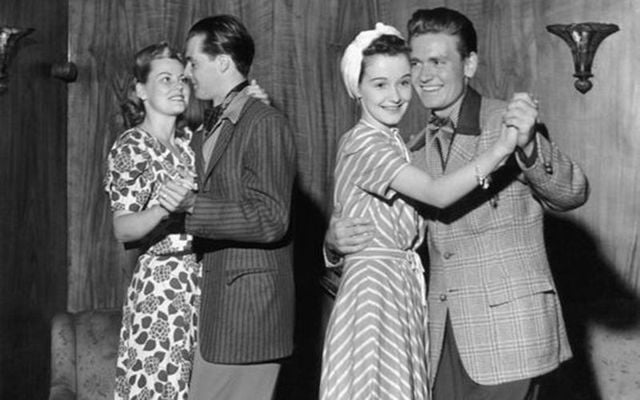Nowadays many love stories begin online. I know a 16-year-old girl who conducts her entire social life, sitting on the sofa, via her smartphone. How sad!
In the Ireland of 1950s and 60s, our love stories began in the marvelous dance halls. These were wonderful places - full of hopes and dreams, full of music and song, full of youth and vitality, noise and energy.
And if you didn’t meet your dream boat tonight, there was always next week.
Anticipation and hope lit up the dull days in between. Girls and boys, from all over the country, came here to dance the night away.
In the 1950s, they waltzed and fox-trotted to the big bands of Maurice Mulcahy and Mick Delahunty. In the 60s, they jived, huckle-bucked, and twisted to the fabulous music of all the fantastic show bands.
Has anything else in life since equaled the heady anticipation and excitement of walking into the dance hall? Would our Mr. Wonderful be there? Would we shift? (Make out, to you Americans.)
The lyrics of the love songs promised us that a man ‘Was the answer to everything.’ They told us that ‘You are nobody ‘til somebody loves you.’ And once we met the man of our dreams we knew we would ‘live happily ever after’ – for hadn’t all The Fairy Tales told us so.
The church was telling us a different story. ‘Ever remember that marriage is a sacrament to be prepared for, not by months and years of sinful indulgence, but by a life of prayer, restraint and purity. Let your head, not your heart, help you to choose a practicing Catholic, who will be sober and industrious. Purity – here much Christian restraint is necessary if you are to enjoy all throughout your marriage the memory of a clean courtship.’
However, we decided that if you obey all the rules you missed all the fun. We set off to the dance hall every weekend, hungry for excitement. When we arrived there it felt as if our world had gone from black and white to color.
In the cloakroom, we watched girls who had cycled in from the country remove their headscarves and raincoats. We watched as they backcombed their hair and applied their ‘battle red’ lipstick.
In the 1950s some girls reddened their cheeks using the cover of The Messenger. They wet their finger and rubbed it along the front of this religious magazine. They then ran their finger over their cheeks and were delighted with their rosy complexion.
Some men, in the 1950s, were known to rub goose grease onto their hair in order to style it. Later in the night, this melted under the bright lights of the dance hall. It ran down their faces and smelt terrible, I am told – for this was before my time.
Read more
We all wanted to be good – but not yet! “I’ll say three acts of Contrition when I go home,” a pal said, as she rolled her skirt up and pulled her jumper off her shoulders. The men wore full dark suits.
Most of these men were called John, Patrick, or both - P.J. All the girls were called Mary, or Maureen, or Marie. Our role model was The Virgin Mary. Of course, there was no sex education then. Those were the days of "see no sex, hear no sex, speak no sex," whilst every house was full of children.
Subtle subconscious messages were conveyed instead. Every night, after the family rosary we said the litany to the ‘Virgin of virgins.’ ‘Virgin most pure, virgin most chaste, virgin undefiled,’ we prayed. We said three Hail Marys every night to keep us ‘pure and holy’.
My granny had a little prayer book for women. We loved reading about what was forbidden - ‘close kissing and embracing (repeated and prolonged) which is normally the source of serious sin against chastity’ – in parked cars, in the dark.’ We couldn’t wait to experience all this! ‘The prayer book stated ‘Sex pleasure is only lawful in marriage and then according to God’s laws. Neither love nor even engagement can ever give couples any right to see or enjoy sexual pleasure outside of marriage.’ We choose to ignore all this advice!
However, the priests were determined to limit our ‘sexual pleasures.’ A friend remembers that the parish priest of Killarney would come out to nearby Ross’s Castle during dances there. He’d walk up and down the lanes shining his bright bicycle lamp into the ditches shouting at the courting couples.
Other friends remember the local carnivals, which took place in villages. Dances were held in a marquee erected in a newly mown hay field. The priest would come, armed with a blackthorn stick and hit the cocks of hay, behind which couples were engaged in ‘close kissing and embracing, repeated and prolonged.’
How can sitting on a sofa with a smartphone be compared with all the excitement of those dance hall days!
* Originally published in February 2019, updated in February 2025.




Comments